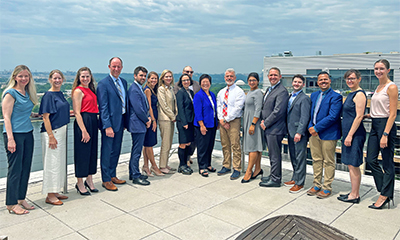Levounis Convenes Medical Leaders to Collaborate on Addiction
Abstract
Attendees from APA and six other medical organizations agreed on the importance of sharing resources and, especially, communication with the public around the importance of addiction treatment. The group will continue to meet and collaborate on advocacy.
Leaders and administrative staff of APA and six other medical organizations representing physicians who treat addiction disorders met at APA headquarters this summer to discuss common goals and strategies for combatting addiction in this country.

APA President Petros Levounis, M.D., M.A. (wearing white shirt), is joined at APA headquarters by leaders and administrative staff of APA and six other medical organizations that are partnering to address the addiction crisis in this country.
The meeting was convened by APA President Petros Levounis, M.D., M.A., as part of his presidential theme, “Confronting Addiction: From Prevention to Recovery,” with a specific focus on vaping, opioids, alcohol, and technology.
APA CEO and Medical Director Saul Levin, M.D., M.P.A., told Psychiatric News after the meeting, “Addiction is a crisis in our country, affecting every segment of the population, and requires the collaborative efforts of all medical professionals who encounter patients with this treatable disorder. Convening these seven organizations that share a common vision at our headquarters is a powerful start to building a national movement that will bring the message of treatment to the public.”
Attendees coalesced around the importance of sharing resources with each other, and—especially—communication with the public to bring attention to the effectiveness of addiction treatments.
“There is not much debate or controversy about what works in the treatment of addiction,” Levounis told Psychiatric News. “We know what works, and we see it every day in our practices. The task we face is to get the message out to the public. The communication staffs of our organizations will be working together to bring a unified medical voice to the message that treatment for addiction works. We want our fellow practitioners of all disciplines and the general public to embrace our enthusiasm about addiction treatment and our commitment to helping patients who live with substance use and behavioral addictions.”
The meeting was presided over by Smita Das, M.D., Ph.D., M.P.H., chair of the APA Council on Addiction Psychiatry, and included council members Lief Fenno, M.D., Ph.D., Jeremy Kidd, M.D., and Tauheed Zaman, M.D., and APA member James Sherer, M.D.
Also participating were Eileen Barrett, M.D., M.P.H., chair of the Board of Regents of the American College of Physicians; Sandy Chung, M.D., president of the American Academy of Pediatrics; Brian Hurley, M.D., M.B.A., president-elect of the American Society of Addiction Medicine Board of Directors; Larissa Mooney, M.D., president of the American Academy of Addiction Psychiatry; Sarah Nosal, M.D., member of the American Academy of Family Physicians Board of Directors; and Mishka Terplan, M.D., M.P.H., representing the American College of Obstetricians and Gynecologists.
Levounis emphasized that administrative staff from the organizations were also invited, ensuring that the collaborative efforts of the participating organizations would be sustained over time. “Presidents come and go, but it is the administrative staff that can sustain this work and make it last,” he said.
Levounis and Das opened the meeting with an overview of APA’s programs devoted to addiction and Levounis’ presidential theme. Kidd, Fenno, Zahman, and Sherer shared specific information about alcohol, opioids, vaping, and technology, respectively. Zahman shared APA’s explainer video about vaping.
Each of the representatives of the participating organizations presented information regarding three questions: What is the organization’s approach to addiction? How does the organization communicate with members, the public, and policymakers about addiction? What is important to the organization about addiction as it relates to the population they serve?
In comments to Psychiatric News, Das said, “We came away with a vision for moving forward together and a commitment to sharing our communications efforts, resources, and best practices and to reconvene every three to six months. What was really obvious and exciting was the shared passion for making a difference for our members, our patients, and the communities we serve. Our immediate focus is on communication with the public, but we hope also in time to collaborate on advocacy with lawmakers and regulatory agencies regarding substance use.”
She added, “Addressing addiction is an enormous challenge, and I urge our members to join in this collaborative effort. We need all hands on deck.” ■
Resource
Explainer video titled What Are the Harms of Vaping?



